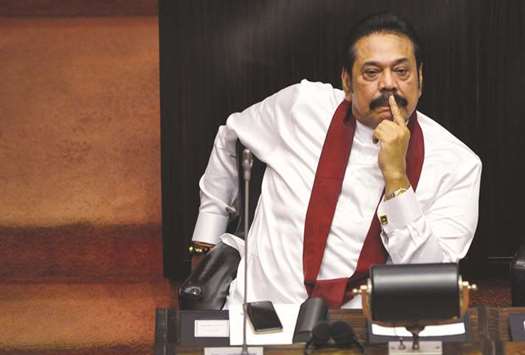The island nation was plunged into crisis in October after Sirisena replaced Wickremesinghe with ex-president Mahinda Rajapakse, without the backing of parliament, leading to protests and downgrades of Sri Lanka’s debt.
Rajapakse, best known for crushing a long-running insurgency in the north of the country and drawing Sri Lanka closer to China, failed to win a parliamentary majority and resigned on Saturday as a government shutdown loomed.
Wickremesinghe was then sworn in as prime minister for the fifth time in a remarkable comeback.
“We joined the government... as the party and the country have been dragged into a difficult position,” Vijith Wijayamuni Soysa, one of the three lawmakers told parliament.
With the latest defections, Wickremesinghe has the backing of 120 legislators in the 225-member parliament.
On Thursday Sri Lanka’s Supreme Court ruled that Sirisena’s decision to dissolve parliament before the end of its term was unconstitutional, a judgement that eventually led to the return of Wickremesinghe as prime minister.
Members of his ruling United National Party and at least six opposition MPs want to oust Sirisena through an impeachment, though that needs a two-thirds majority in parliament.
Rajapakse named opposition
leader: Rajapakse, who resigned from the prime ministerial position on December 15, was appointed leader of the opposition by Speaker Karu
Jayasuriya yesterday amid a row.
Jayasuriya said since President Sirisena’s United People’s Freedom Alliance is the largest opposition party, he recognised Rajapakse as the leader of the opposition even as the ruling United National party (UNP) and the Tamil National Alliance (TNA) objected to the decision.
TNA lawmaker M A Sumanthiran said Rajapakse could not be appointed as he had resigned from the United People’s Freedom Alliance and joined the Sri Lanka Podujana Peramuna.
He urged the speaker to appoint a committee to probe Rajapakse’s appointment.
Sumanthiran was asked to hand over his complaints in writing to be considered on
Friday.
Rajapakse returned to parliament in 2015 as an ordinary member of parliament, an office he had held for decades before becoming president for two consecutive terms from 2005 until 2015.

